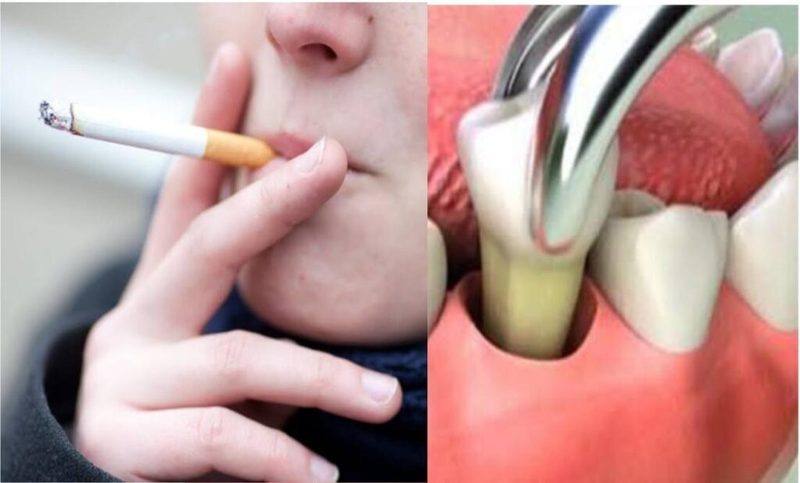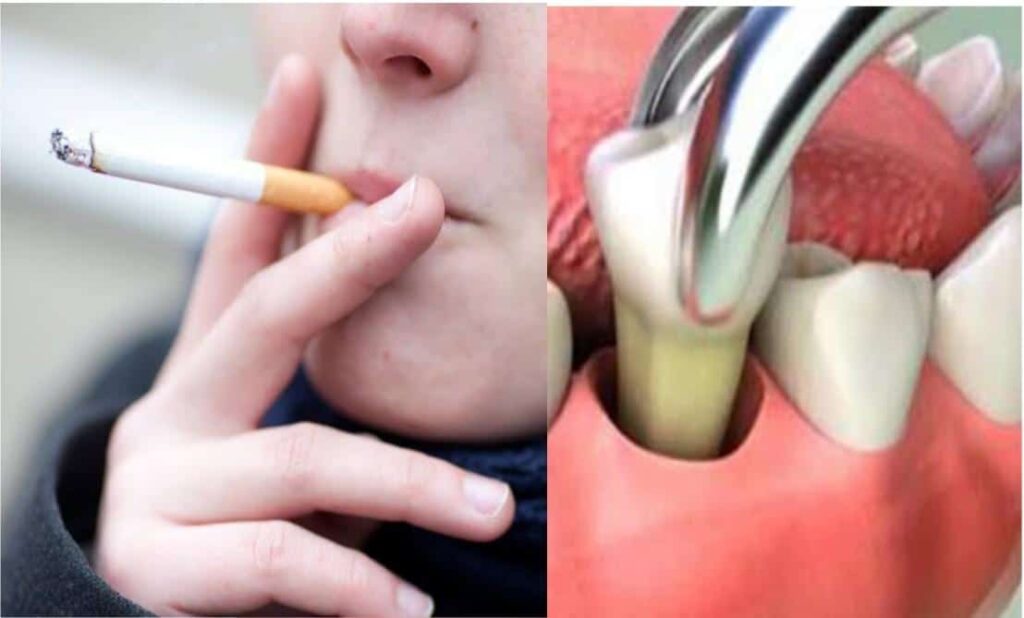
Smoking after tooth surgery can be a burning question in your mind before seeing the dentist. Harmful chemicals from smoking can hinder healing and irritate surgical sites. It may strain the area, delaying recovery. Thus, it is best practice to avoid smoking post-surgery. Prioritize your oral health and heed your dentist’s guidance. In the following sections, we’ll explain why smoking is discouraged and suggest healthier strategies to ensure a smooth, complication-free recovery. Say no to smoking for a better post-operative journey.
- Hindrance to Healing: Smoking can impede the healing process after dental surgery and elevate the risk of complications like dry socket, infection, and delayed recovery.
- Chemical Irritation: Cigarette chemicals can irritate the surgical site, potentially leading to discomfort and further complications.
- Impaired Blood Flow: Smoking restricts blood flow, which is vital for proper healing and tissue regeneration.
- Recommended Abstinence: It is advisable to refrain from smoking for a minimum of 48 to 72 hours after dental surgery, or follow the specific guidance provided by your dentist or oral surgeon.

Can You Smoke After Dental Surgery?
Smoking post-dental surgery can compromise healing and trigger complications, highlighting the importance of abstaining for a successful recovery.
The Impact of Smoking on Dental Surgery Recovery
Effects of Smoking on Dental Surgery Recovery:
- Hindered Healing: Whether it’s a tooth extraction or complex dental implant surgery, your mouth tissues require healing time. Smoking introduces toxins that can slow down this process, elevating the risk of infection.
- Nicotine’s Blood Flow Impact: Nicotine in cigarettes constricts blood vessels, diminishing blood flow to the surgical site. This reduces the delivery of vital nutrients and oxygen to the healing tissues.
- Weakened Immune System: Smoking impairs your immune system’s function, making it harder for your body to fend off infections. This heightens the risk of complications, including dry socket, where the protective blood clot dislodges, exposing underlying bone and nerves.
The Dangers of Smoking After Dental Surgery
Effects of Smoking After Dental Surgery:
- Healing Delays: Smoking’s chemicals can hinder the healing process, causing prolonged pain and discomfort post-dental surgery.
- Increased Infection Risk: Smoking raises the risk of infection, potentially resulting in more severe complications.
- Dry Socket Complications: Smoking is linked to one of the most common issues after dental surgery – dry socket. This painful condition can lead to bad breath and further delays in healing.
- Impact on Dental Implants: For procedures like dental implant surgery, smoking can reduce the success rate by impeding osseointegration, where the bone fuses with the implant. This interference can lead to implant failure.
Benefits of Not Smoking After Dental Surgery
Benefits of Not Smoking Post-Dental Surgery:
- Enhanced Healing: Avoiding smoking enables proper healing of oral tissues, minimizing the risk of complications and promoting faster recovery.
- Quicker Return to Normalcy: Faster healing allows you to resume regular activities sooner, improving your overall well-being.
- Long-Term Oral Health: Quitting smoking post-surgery offers lasting benefits, as smoking is a risk factor for gum disease and oral cancer.
- Reduced Risk: By giving up smoking, you decrease the chances of developing serious oral health conditions and enhance the overall well-being of your mouth.
Tips for Quitting Smoking After Dental Surgery
Quitting smoking can be challenging, but it is essential for a successful recovery after dental surgery. Here are some tips to help you quit smoking:
- Seek support from friends, family, or a support group
- Consider nicotine replacement therapy, such as nicotine patches or gum
- Find alternative ways to manage stress, such as exercise or meditation
- Remove smoking triggers from your environment
- Reward yourself for reaching milestones in your journey to quit smoking
Remember, quitting smoking is not only beneficial for your dental surgery recovery but also for your overall health and well-being. Talk to your dentist or healthcare provider for additional support and resources to help you quit smoking.
Conclusion
Resisting post-surgery smoking is crucial. It speeds healing, lowers complication risks, and offers long-term oral health benefits. Prioritize your recovery and well-being by quitting smoking.
Key Takeaways:
- Smoking after dental surgery can delay the healing process.
- Smoking can increase the risk of infection in the surgical site.
- Smoking can hinder blood flow and reduce oxygen supply to the surgical area.
- Smoking can cause dry socket, a painful condition that can occur after tooth extraction.
- It is best to avoid smoking for at least 48 hours after dental surgery to promote proper healing.
Frequently Asked Questions
Is it safe to smoke after dental surgery?
Smoking after dental surgery delays healing and may cause irritation and inflammation at the surgical site. It restricts blood flow, lowers oxygen levels, and raises infection and dry socket risks. Avoid smoking for a smooth, complication-free recovery.
What are the risks of smoking after dental surgery?
Smoking post-dental surgery hinders healing by disrupting blood clot formation, potentially leading to delayed recovery, pain, and infection. It can cause dry socket, a painful condition, and contribute to gum disease, tooth decay, and overall poor oral health. Avoiding smoking is crucial for optimal healing and complication prevention.
When can I smoke after dental surgery?
Refrain from smoking for 48-72 hours after dental surgery to facilitate initial healing and reduce complications. Healing times vary, so consult your dentist for guidance. Sometimes it is bets practice to avoid for 7-10 days. Smokers can explore nicotine replacement therapy or alternatives to manage cravings while prioritizing oral health and healing post-surgery.
What can I do to quit smoking after dental surgery?
Quitting smoking after dental surgery is essential for your oral health and overall well-being. Here are some tips to help you in your journey to quit smoking:
1. Seek support: Reach out to friends, family, or support groups for encouragement and guidance.
2. Nicotine replacement therapy: Consider using nicotine patches, gum, or lozenges to gradually reduce your nicotine dependence.
3. Find alternatives: Engage in activities that distract you from smoking, such as exercising, reading, or practicing relaxation techniques.
4. Stay motivated: Remind yourself of the benefits of quitting smoking, such as improved oral health, better breath, and reduced risk of complications.
5. Consult with your dentist: Your dentist can provide additional support and resources to help you quit smoking and maintain good oral health.
What are the long-term effects of smoking after dental surgery?
Post-Dental Surgery Smoking Effects:
- Oral Health Risks: Smoking is a significant risk factor for dental issues like gum disease, tooth decay, and oral cancer, threatening your oral health.
- Healing Impairment: Smoking can delay surgical wound healing and heighten infection risks due to its detrimental impact on the body’s ability to heal.
- Cosmetic Consequences: Persistent bad breath, stained teeth, and impaired taste and smell senses are common side effects of smoking.
- Respiratory Issues: Smoking can contribute to chronic respiratory conditions like COPD and bronchitis, impacting overall well-being.
Quit Smoking for Better Health: Quitting smoking is essential to safeguard oral health, reduce complications, and enhance overall quality of life.
The truth about smoking and dry socket
Final Summary: Can You Smoke After Dental Surgery?
Avoiding smoking after dental surgery is crucial for a successful recovery. Smoking restricts blood vessels, reducing blood flow to the surgical site, delaying healing, and increasing infection risks. It also weakens the immune system, making it harder to fight off infections. Inhaling smoke introduces harmful bacteria and contaminants into the mouth, jeopardizing the healing process. Prioritize oral health and allow your body to heal by refraining from smoking during this critical period. Consult with your dentist or oral surgeon for personalized guidance. Prioritizing recovery and making lifestyle adjustments ensures optimal healing and a healthy smile for the future.
Call or Book appointment online
:Ace Dental Care Alpharetta office: 678-562-1555 - Book Now
Ace Dental Care Norcross office: 770-806-1255 - Book Now
Disclaimer
This blog post was generated by artificial intelligence. The content of this post may not be accurate or complete, and should not be relied upon as a substitute for professional advice. If you have any questions about the content of this post, please contact us.
We are constantly working to improve the accuracy and quality of our AI-generated content. However, there may still be errors or inaccuracies. We apologize for any inconvenience this may cause.





